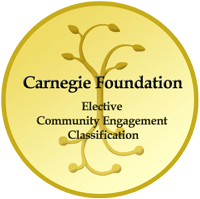 |
|
The Carnegie Foundation for the Advancement of Teaching announced today that UMass Medical School has been selected to receive renewed Community Engagement Classification. UMMS, the first medical school awarded the designation in 2008 and one of just 361 institutions so designated nationwide, was recognized for “excellent alignment among campus mission, culture, leadership, resources and practices that support dynamic and noteworthy community engagement.”
“The importance of this elective classification is borne out by the response of so many campuses that have demonstrated their deep engagement with local, regional, national and global communities,” said John Saltmarsh, director of the New England Resource Center for Higher Education. “These are campuses that are improving teaching and learning, producing research that makes a difference in communities, and revitalizing their civic and academic missions.”
Unlike the Carnegie Foundation’s other classifications that rely on national data, this is an “elective” classification—institutions participated voluntarily by submitting required materials describing the nature and extent of their engagement with the community, be it local or beyond. This approach enabled the Carnegie Foundation to address elements of institutional mission and distinctiveness that are not represented in the national data on colleges and universities.
UMMS and clinical partner UMass Memorial Health Care undertook extensive data collection and documentation of important aspects of institutional mission, identity and commitments and submitted them to Carnegie for consideration.
A key to the classification as “community engaged” is the institutions’ fundamental alignment of mission and actions. Notable examples include maintaining affordability, commitment to primary care education, outstanding instruction in community health and culturally appropriate care, and community-responsive educational offerings in health care and research.
“Just as our public service mission has expanded over time since our inception in 1962, our commitment to community engagement has been strengthened and expanded since our initial Carnegie classification in 2008,” said Chancellor Michael F. Collins. “The ways in which our public service mission manifests itself have evolved from an initial focus on activities directly related to providing affordable medical education and improving access to primary care to our current diverse and global orientation. But whether the community with which we engage is around the corner or across the globe, open communication and dialogue are central features of our initiatives.”
Among the many specific programs and partnerships highlighted were Commonwealth Medicine, whose mission is to improve health care outcomes, access and affordability; MassBiologics, the only non-profit FDA-licensed vaccine manufacturing facility in the country; and numerous strong local and international partnerships, such as the Worcester Pipeline Collaborative through which UMMS partners with Worcester Public Schools to prepare K–12 students for the region’s health care and science oriented economy; the active partnership with the City of Worcester Division of Public Health to achieve community health goals; and the longstanding partnership with the government of Liberia, the University of Liberia and the John F. Kennedy Medical Center to rebuild the country’s health care infrastructure.
Also highlighted were the UMass Center for Clinical and Translational Science, which works to move laboratory discoveries into treatments, to engage communities in clinical research and to train a new generation of researchers; the Center for Health Equity Research, which is striving to illuminate community based health impacts; and the Office of Global Health, which is charged with enhancing and expanding research and training programs for global health improvement and disease prevention strategies.
Specific educational initiatives cited include the Population Health Clerkship, which is mandatory for nursing and medical students, and the Martin Luther King Jr. Semester of Service project grants that support student-designed community-responsive service learning projects in the Worcester area.
“The Carnegie Community Engagement Classification is a reflection of the mission and values of UMass Medical School,” said James Leary, JD, vice chancellor for community and government relations. “As an institution, we are deeply committed to enriching the surrounding communities and the renewal of our Carnegie classification highlights that commitment.”